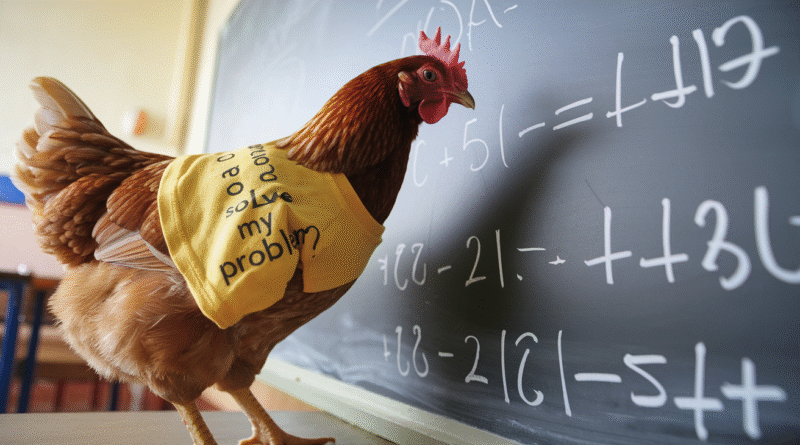The Chicken That Could Solve Math Problems : A Viral Sensation from India
In the bustling city of Bengaluru, India, an unexpected global sensation has emerged from a small poultry farm. However, it’s not the farm’s eggs or meat that’s drawing attention—it’s a chicken named “Chintu” who appears to have developed the remarkable ability to solve basic math problems. What started as a curious local story has quickly gained international fame, sparking debates among scientists, animal behaviorists, and social media users. Is it an elaborate trick, a display of extraordinary animal intelligence, or something else entirely?
Chintu, a white Leghorn hen, has captured the hearts of millions through viral videos showing her tapping her beak on numbered cards, seemingly solving simple math problems. While the idea of a chicken performing arithmetic might seem far-fetched, Chintu’s impressive performances have left people stunned. In this article, we look at how Chintu’s talent was discovered, the reactions from the scientific community, and what her abilities mean for our understanding of animal intelligence.
Chintu the Math Chicken: How It All Began
Chintu’s journey to fame began when her owner, Suresh Kumar, a retired schoolteacher and dedicated poultry farmer, noticed something unusual in her behavior. Kumar enjoyed interacting with his chickens, engaging them in playful activities and offering food rewards. One day, while teaching his niece basic math, he saw Chintu pecking at numbered cards as they worked through problems. To his surprise, Chintu appeared to peck at the correct answers, as though she understood the math.
Skeptical at first, Kumar started testing Chintu with simple math problems like “2 + 3” or “4 – 1” written on a small board. He would place three numbered cards beside the board, and Chintu consistently pecked at the right answer. Fascinated, Kumar began filming these sessions and posted them online. The videos quickly went viral, and what began as a local curiosity soon captivated audiences worldwide.
As millions of people viewed Chintu’s videos, social media was flooded with questions and theories. Could Chintu really understand math? Was she responding to subtle cues from her owner? Or was there another explanation? The viral sensation caught the attention of scientists, and the debate began.
The Viral Sensation: Global Reactions
As Chintu’s fame spread, she became known as the “Einstein of Chickens” and the “Math Poultry Prodigy.” Social media buzzed with memes, parodies, and challenges as fans shared videos of their own pets attempting math tricks, though most didn’t match Chintu’s prowess. The hashtag #ChintuTheMathChicken trended on Twitter for weeks, turning the chicken into an international star.
Amid the online excitement, scientists and animal behavior experts began to investigate the phenomenon. Could Chintu really be doing math, or was she responding to something more subtle?
Dr. Asha Patil, an animal cognition expert from the University of Delhi, weighed in on the debate. “Chickens, like many animals, can recognize patterns and respond to stimuli. It’s unlikely that Chintu understands math as humans do, but she might be reacting to subtle cues like body language, tone of voice, or the arrangement of the cards,” Patil explained.
This explanation didn’t diminish the enthusiasm surrounding Chintu but raised important questions about how animals perceive the world. Was Chintu’s math-solving ability a result of operant conditioning, where she had learned to associate certain numbers with rewards? Or was something more extraordinary at play?
Scientific Investigations: Unraveling the Mystery
Following Chintu’s viral success, scientists from different disciplines began investigating her abilities. Researchers from fields such as animal behavior, cognitive psychology, and mathematics were eager to see if Chintu’s skills could be replicated under controlled conditions. Proud of his chicken’s newfound fame, Kumar allowed a team from the Indian Institute of Science (IISc) in Bengaluru to observe Chintu and conduct experiments.
The researchers set up a series of tests to rule out the possibility of Chintu picking up on cues from her environment or owner. In these tests, math problems were presented, and the answer cards were arranged randomly and at varying distances. Remarkably, Chintu still managed to peck the correct answers more often than chance would suggest.
Lead researcher Dr. Arvind Rao commented, “Chintu’s abilities are intriguing. While we can’t say for certain that she understands math as we do, her consistent accuracy suggests there’s more going on than we previously understood. Whether it’s pattern recognition, advanced conditioning, or something else, we’re keen to explore it further.”
Not all experts were convinced. Dr. Meera Das, a comparative psychologist, cautioned that many animals have been trained to perform impressive tasks by picking up subtle, often subconscious signals from their handlers. “We’ve seen cases where animals like dogs, horses, and even birds seem to do incredible things, but upon closer investigation, they’re often reacting to tiny, unintentional cues from humans,” she noted.
Despite the skepticism, Chintu’s performances have reignited discussions about animal cognition and problem-solving, sparking a fresh wave of scientific interest in the field.
The Broader Implications: Rethinking Animal Intelligence
Chintu’s viral fame has raised important questions about how we perceive animal intelligence and the capabilities of creatures we often underestimate. Chickens, long considered simple animals, are now receiving more attention from scientists.
Studies have already shown that chickens are capable of recognizing individuals, establishing social hierarchies, and remembering learned tasks. Some research has even demonstrated that chickens can perform basic arithmetic, such as counting objects or determining which of two groups is larger. However, Chintu’s apparent ability to solve math problems at a higher level suggests there’s more to learn about poultry cognition.
Beyond Chintu’s case, her story has broader implications for how we view and treat animals. If animals are more intelligent than we realize, it may prompt changes in the way we raise, train, and care for them. As the study of animal intelligence continues to grow, our understanding of their mental lives may need to be reevaluated.
What Lies Ahead for Chintu?
As Chintu continues to captivate audiences worldwide, her owner Suresh Kumar remains humble. “I never thought Chintu would become this famous,” he said in an interview. “To me, she’s just a clever chicken who enjoys playing games with us. But if she can help people see animals in a new light, that’s a good thing.”
For now, Chintu enjoys a peaceful life on Kumar’s farm, where visitors often come hoping to witness her math skills firsthand. Researchers continue to study her behavior, and the viral phenomenon shows no signs of fading.
Whether Chintu’s abilities are an extraordinary display of animal cognition or a testament to advanced training, her story has opened new pathways for understanding the relationship between humans and animals. What began as a quirky internet sensation could have far-reaching implications, challenging our assumptions about intelligence in the animal kingdom.







